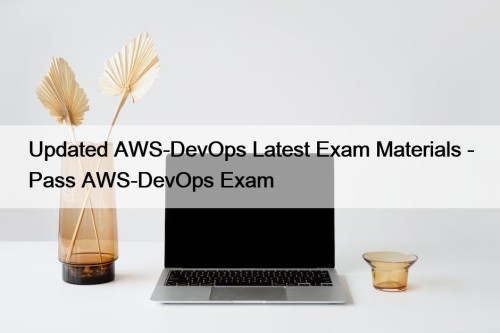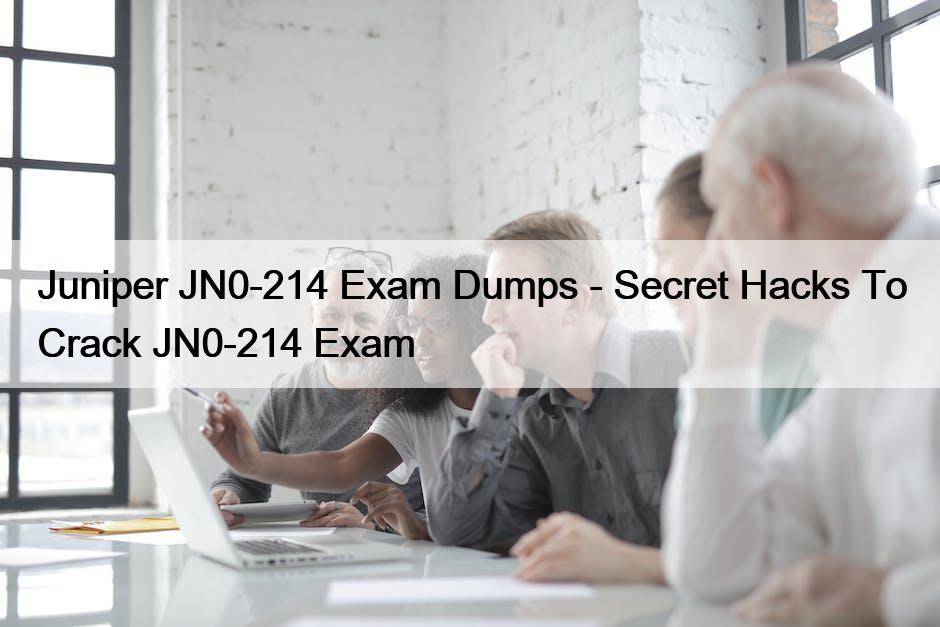Most Popular
 Pass B2B-Solution-Architect Exam with Salesforce's Exam Questions and Achieve 100% Success on Your First Try
Pass B2B-Solution-Architect Exam with Salesforce's Exam Questions and Achieve 100% Success on Your First Try
P.S. Free & New B2B-Solution-Architect dumps are available on Google ...
 Updated AWS-DevOps Latest Exam Materials - Pass AWS-DevOps Exam
Updated AWS-DevOps Latest Exam Materials - Pass AWS-DevOps Exam
What's more, part of that TrainingDumps AWS-DevOps dumps now are ...
 GCFE Latest Braindumps Questions, GCFE Certification Sample Questions
GCFE Latest Braindumps Questions, GCFE Certification Sample Questions
Before you purchase our product you can have a free ...



Juniper JN0-214 Exam Dumps - Secret Hacks To Crack JN0-214 Exam

What's more, part of that Pass4suresVCE JN0-214 dumps now are free: https://drive.google.com/open?id=1vaNHBHvBaUzXiNWkoLJzc5KalLBFOp13
In order to meet the needs of all people, the experts of our company designed such a JN0-214 guide torrent that can help you pass your exam successfully. Having our study materials, it will be very easy for you to get the certification in a short time. If you try purchase our study materials, you will find our JN0-214 question torrent will be very useful for you. We are confident that you will be attracted to our JN0-214 guide question.
Juniper JN0-214 Exam Syllabus Topics:
| Topic | Details |
|---|---|
| Topic 1 |
|
| Topic 2 |
|
| Topic 3 |
|
| Topic 4 |
|
>> Detailed JN0-214 Study Plan <<
Free PDF 2025 Juniper JN0-214: Cloud, Associate (JNCIA-Cloud) –Valid Detailed Study Plan
As far as we know, our JN0-214 exam prep have inspired millions of exam candidates to pursuit their dreams and motivated them to learn more high-efficiently. Our JN0-214 practice materials will not let your down. To lead a respectable life, our experts made a rigorously study of professional knowledge about this exam. We can assure you the proficiency of our JN0-214 Exam Prep. So this is a definitive choice, it means our JN0-214 practice materials will help you reap the fruit of success.
Juniper Cloud, Associate (JNCIA-Cloud) Sample Questions (Q23-Q28):
NEW QUESTION # 23
Click to the Exhibit button.
Referring to the exhibit, which two statements are correct? (Choose two.)
- A. The myvSRX instance is a part of a default network.
- B. The myvSRX instance is using a default image.
- C. The myvSRX instance is currently running.
- D. The myvSRX instance is created using a custom flavor.
Answer: C,D
Explanation:
The openstack server list command provides information about virtual machine (VM) instances in the OpenStack environment. Let's analyze the exhibit and each statement:
Key Information from the Exhibit:
The output shows details about the myvSRX instance:
Status: ACTIVE (indicating the instance is running).
Networks: VN-A-10.1.0.3 (indicating the instance is part of a specific network).
Image: vSRX3 (indicating the instance was created using a custom image).
Flavor: vSRX-Flavor (indicating the instance was created using a custom flavor).
Option Analysis:
A . The myvSRX instance is using a default image.
Incorrect: The image name vSRX3 suggests that this is a custom image, not the default image provided by OpenStack.
B . The myvSRX instance is a part of a default network.
Incorrect: The network name VN-A-10.1.0.3 indicates that the instance is part of a specific network, not the default network.
C . The myvSRX instance is created using a custom flavor.
Correct: The flavor name vSRX-Flavor indicates that the instance was created using a custom flavor, which defines the CPU, RAM, and disk space properties.
D . The myvSRX instance is currently running.
Correct: The ACTIVE status confirms that the instance is currently running.
Why These Statements?
Custom Flavor: The vSRX-Flavor name clearly indicates that a custom flavor was used to define the instance's resource allocation.
Running Instance: The ACTIVE status confirms that the instance is operational and available for use.
JNCIA Cloud Reference:
The JNCIA-Cloud certification emphasizes understanding OpenStack commands and outputs, including the openstack server list command. Recognizing how images, flavors, and statuses are represented is essential for managing VM instances effectively.
For example, Juniper Contrail integrates with OpenStack Nova to provide advanced networking features for VMs, ensuring seamless operation based on their configurations.
Reference:
OpenStack CLI Documentation: openstack server list Command
Juniper JNCIA-Cloud Study Guide: OpenStack Compute
NEW QUESTION # 24
Which cloud service model provides access to networking, storage, servers, and virtualization in a cloud environment?
- A. Infrastructure as a Service (IaaS)
- B. Software as a Service (SaaS)
- C. Platform as a Service (PaaS)
- D. Database as a Service (DaaS)
Answer: A
Explanation:
Cloud service models define how services are delivered and managed in a cloud environment. The three primary models are:
Infrastructure as a Service (IaaS): Provides virtualized computing resources such as servers, storage, networking, and virtualization over the internet. Customers manage their own operating systems, applications, and data, while the cloud provider manages the underlying infrastructure.
Platform as a Service (PaaS): Provides a platform for developers to build, deploy, and manage applications without worrying about the underlying infrastructure. Examples include Google App Engine and Microsoft Azure App Services.
Software as a Service (SaaS): Delivers fully functional applications over the internet, eliminating the need for users to install or maintain software locally. Examples include Salesforce CRM, Google Workspace, and Microsoft Office 365.
Database as a Service (DaaS): A specialized subset of PaaS that provides managed database services.
In this question, the focus is on access to networking, storage, servers, and virtualization , which are the core components of IaaS . IaaS allows customers to rent infrastructure on-demand and build their own environments without investing in physical hardware.
Why IaaS?
Flexibility: Customers have full control over the operating systems, applications, and configurations.
Scalability: Resources can be scaled up or down based on demand.
Cost Efficiency: Pay-as-you-go pricing eliminates upfront hardware costs.
JNCIA Cloud Reference:
The JNCIA-Cloud certification emphasizes understanding the different cloud service models and their use cases. IaaS is particularly relevant for organizations that want to leverage cloud infrastructure while maintaining control over their applications and data.
For example, Juniper Contrail integrates with IaaS platforms like OpenStack to provide advanced networking and security features for virtualized environments.
Reference:
NIST Cloud Computing Reference Architecture
Juniper JNCIA-Cloud Study Guide: Cloud Service Models
NEW QUESTION # 25
What are two available installation methods for an OpenShift cluster? (Choose two.)
- A. user-provisioned infrastructure
- B. kubeadm
- C. kubesprav
- D. installer-provisioned infrastructure
Answer: A,D
Explanation:
There are two available installation methods for an OpenShift cluster. One is the installer- provisioned infrastructure method, and the other is the user-provisioned infrastructure method.
NEW QUESTION # 26
You just uploaded a qcow2 image of a vSRX virtual machine in OpenStack.
In this scenario, which service stores the virtual machine (VM) image?
- A. Ironic
- B. Nova
- C. Neutron
- D. Glance
Answer: D
Explanation:
OpenStack provides various services to manage cloud infrastructure resources, including virtual machine (VM) images. Let's analyze each option:
A . Glance
Correct: Glance is the OpenStack service responsible for managing and storing VM images. It provides a repository for uploading, discovering, and retrieving images in various formats, such as qcow2, raw, or ISO.
B . Ironic
Incorrect: Ironic is the OpenStack bare-metal provisioning service. It is used to manage physical servers, not VM images.
C . Neutron
Incorrect: Neutron is the OpenStack networking service that manages virtual networks, routers, and IP addresses. It does not store VM images.
D . Nova
Incorrect: Nova is the OpenStack compute service that manages the lifecycle of virtual machines. While Nova interacts with Glance to retrieve VM images for deployment, it does not store the images itself.
Why Glance?
Image Repository: Glance acts as the central repository for VM images, enabling users to upload, share, and deploy images across the OpenStack environment.
Integration with Nova: When deploying a VM, Nova retrieves the required image from Glance to create the instance.
JNCIA Cloud Reference:
The JNCIA-Cloud certification covers OpenStack services, including Glance, as part of its cloud infrastructure curriculum. Understanding Glance's role in image management is essential for deploying and managing virtual machines in OpenStack.
For example, Juniper Contrail integrates with OpenStack Glance to provide advanced networking features for VM images stored in the repository.
Reference:
OpenStack Glance Documentation
Juniper JNCIA-Cloud Study Guide: OpenStack Services
NEW QUESTION # 27
Which two consoles are provided by the OpenShift Web UI? (Choose two.)
- A. operational console
- B. developer console
- C. administrator console
- D. management console
Answer: B,C
Explanation:
OpenShift provides a web-based user interface (Web UI) that offers two distinct consoles tailored to different user roles. Let's analyze each option:
A . administrator console
Correct:
The administrator console is designed for cluster administrators. It provides tools for managing cluster resources, configuring infrastructure, monitoring performance, and enforcing security policies.
B . developer console
Correct:
The developer console is designed for application developers. It focuses on building, deploying, and managing applications, including creating projects, defining pipelines, and monitoring application health.
C . operational console
Incorrect:
There is no "operational console" in OpenShift. This term does not correspond to any official OpenShift Web UI component.
D . management console
Incorrect:
While "management console" might sound generic, OpenShift specifically refers to the administrator console for management tasks. This term is not officially used in the OpenShift Web UI.
Why These Consoles?
Administrator Console: Provides a centralized interface for managing the cluster's infrastructure and ensuring smooth operation.
Developer Console: Empowers developers to focus on application development without needing to interact with low-level infrastructure details.
JNCIA Cloud Reference:
The JNCIA-Cloud certification emphasizes understanding OpenShift's Web UI and its role in cluster management and application development. Recognizing the differences between the administrator and developer consoles is essential for effective collaboration in OpenShift environments.
For example, Juniper Contrail integrates with OpenShift to provide advanced networking features, leveraging both consoles for seamless operation.
Reference:
OpenShift Documentation: Web Console Overview
Juniper JNCIA-Cloud Study Guide: OpenShift Web UI
NEW QUESTION # 28
......
With all the above merits, the most outstanding one is 100% money back guarantee of your success. Our JN0-214 experts deem it impossible to drop the exam, if you believe that you have learnt the contents of our JN0-214 study guide and have revised your learning through the JN0-214 Practice Tests. If you still fail to pass the exam, you can take back your money in full without any deduction. Such bold offer is itself evidence on the excellence of our products and their indispensability for all those who want success without any second thought.
Real JN0-214 Exam: https://www.pass4suresvce.com/JN0-214-pass4sure-vce-dumps.html
- Free PDF 2025 Juniper The Best JN0-214: Detailed Cloud, Associate (JNCIA-Cloud) Study Plan 🐕 Copy URL ✔ www.prep4away.com ️✔️ open and search for ⇛ JN0-214 ⇚ to download for free 🅰JN0-214 Valid Dumps Questions
- JN0-214 Valid Dumps Questions 🎆 Valid JN0-214 Exam Duration 🤷 Certification JN0-214 Exam Infor 🤾 Search for ▶ JN0-214 ◀ and download it for free immediately on 《 www.pdfvce.com 》 👘JN0-214 Exam Bootcamp
- Updated Detailed JN0-214 Study Plan - Easy and Guaranteed JN0-214 Exam Success 🚧 Easily obtain free download of 「 JN0-214 」 by searching on “ www.pdfdumps.com ” 🎤JN0-214 New Real Exam
- JN0-214 Reliable Test Experience Ⓜ Latest JN0-214 Exam Book 🕓 JN0-214 Exam Bootcamp 🔉 Go to website ➠ www.pdfvce.com 🠰 open and search for ➠ JN0-214 🠰 to download for free 🏑JN0-214 High Quality
- Exam JN0-214 Assessment 📻 Latest JN0-214 Exam Cost 🧧 Exam JN0-214 Online 🔓 Simply search for ➡ JN0-214 ️⬅️ for free download on ▷ www.getvalidtest.com ◁ 🥟Exam JN0-214 Book
- Reliable JN0-214 Exam Answers 📙 JN0-214 Valid Dumps Questions 🅰 Reliable JN0-214 Dumps Pdf 🍺 The page for free download of “ JN0-214 ” on ✔ www.pdfvce.com ️✔️ will open immediately 📙Valid JN0-214 Exam Duration
- Pass Guaranteed Quiz 2025 High-quality Juniper Detailed JN0-214 Study Plan 🧞 Download 【 JN0-214 】 for free by simply entering 【 www.prep4away.com 】 website ⛹Latest JN0-214 Exam Book
- Detailed JN0-214 Study Plan | 100% Free High-quality Real Cloud, Associate (JNCIA-Cloud) Exam 💉 ➠ www.pdfvce.com 🠰 is best website to obtain ➤ JN0-214 ⮘ for free download 🈺Exam JN0-214 Online
- Certification JN0-214 Exam Infor 🏈 JN0-214 Exam Practice 🥅 JN0-214 New Real Exam 📓 Download 《 JN0-214 》 for free by simply searching on 【 www.prep4away.com 】 🟥Valid JN0-214 Exam Duration
- JN0-214 Exam Bootcamp 🔮 Reliable JN0-214 Dumps Pdf ❎ JN0-214 Valid Dumps Questions 😮 Enter 《 www.pdfvce.com 》 and search for { JN0-214 } to download for free 📝JN0-214 Exam Practice
- JN0-214 Valid Dumps Questions 🍏 Exam JN0-214 Book 🔯 Exam JN0-214 Assessment 🐑 Search for ⮆ JN0-214 ⮄ on ➠ www.examcollectionpass.com 🠰 immediately to obtain a free download 😘Exam JN0-214 Book
- JN0-214 Exam Questions
- xiquebbs.xyz zybls.com 144.48.143.207 test-sida.noads.biz www.meilichina.com www.comsenz-service.com www.tdx001.com test-sida.noads.biz 須彌天堂.官網.com 屠龍者天堂.官網.com
BTW, DOWNLOAD part of Pass4suresVCE JN0-214 dumps from Cloud Storage: https://drive.google.com/open?id=1vaNHBHvBaUzXiNWkoLJzc5KalLBFOp13
Tags: Detailed JN0-214 Study Plan, Real JN0-214 Exam, JN0-214 Reliable Exam Guide, JN0-214 Actual Exam Dumps, Exam JN0-214 Syllabus